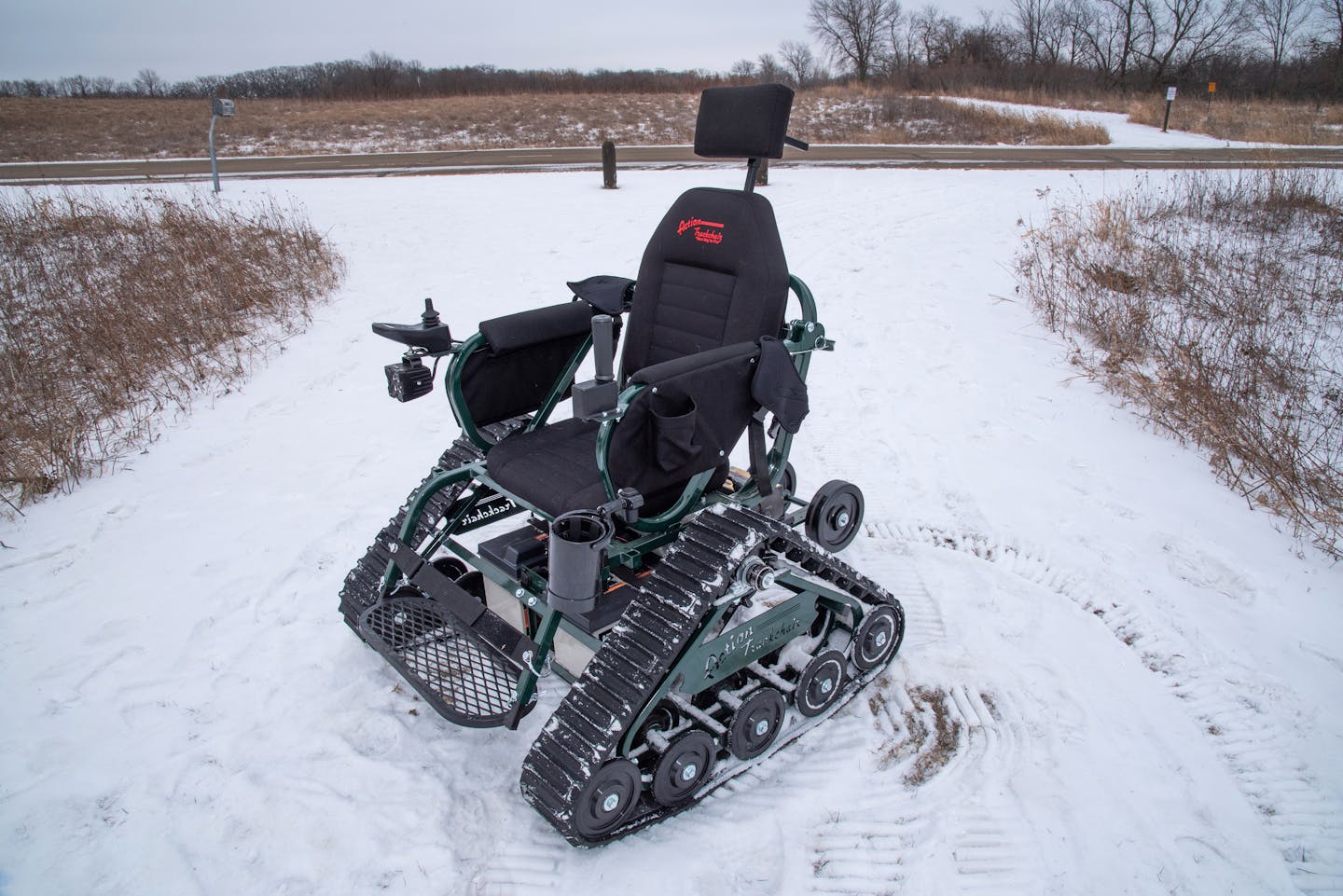By early summer, a few Minnesota state parks will offer a means for disabled visitors to move through trail landscapes in ways they maybe never thought possible.
Five parks will have an Action Trackchair for use — part all-terrain vehicle, part beefed-up electric wheelchair, and designed with tank-like treads to navigate rugged terrain if necessary.
A pilot project by the Department of Natural Resources, the wheelchairs are located at Camden (Lynd), Crow Wing (Brainerd), Maplewood (Pelican Rapids) and Myre-Big Island (near Albert Lea) state parks. A fifth chair will be placed soon, and all should be available to use by early summer, said Jamie McBride, a DNR parks and trails consultant. The specialized chairs are made by Action Manufacturing in Marshall, Minn., and cost $14,500 apiece.
Plans to get these in some Minnesota parks began about two years ago. McBride said sustainability was top of mind when deciding which parks received chairs. Some criteria included trail lengths, surfaces and their condition; the staff's capacity to manage use of the Trackchairs; the presence of rare plants and invasive species; and physical barriers.
He said that park infrastructure didn't change to accommodate chairs, although Maplewood was selected because of some trail improvements suited to a Trackchair, including access to the park's highest point, Hallaway Hill, known for its vistas.
Each park will have at least one suggested trail for the chairs. McBride said each park also will manage its own reservation system, and the chairs are free to use. To date, all state parks allow power-driven and manual mobility aids provided they comply with park regulations.
McBride said the DNR will evaluate the demand for the chairs and users' experiences, among other things, before deciding whether to expand the program to more parks. Money from the state's Parks and Trails Legacy Fund helped pay for four of the chairs. A fifth was donated.
"This is a pilot program and a lot of things have to fall into place to broaden it," McBride said.
Brad Strootman, who manages outdoor projects for Action Manufacturing, said the joystick-controlled chairs are used on public lands in 16 states. Michigan's Department of Natural Resources was the first to buy chairs and put them in parks, and was a conduit for the company to connect with other park systems, Strootman said. Action Manufacturing's presence at a state parks association gathering a few years ago was instrumental.
Michigan started with five chairs donated by the nonprofit Kali's Cure, whose namesake suffered a spinal injury in a diving accident. Now, there are 12 chairs in state parks, with work continuing to pay for more, said Michelle O'Kelly, a Michigan DNR fund development officer.
"The feedback has been fantastic," she said.
Strootman said the chair was borne of tragedy. Action Manufacturing owner Tim Swenson developed the prototype in 2007 for his son, Jeff, to keep him in the outdoors after he was paralyzed in a vehicle accident. Now, 5,700 chairs across several models have been sold, like the one in the state parks that has a wider base for stability and is suited to tracks beyond pavement.
According to the 2018 U.S. Census Bureau's American Community Survey, about 595,684 Minnesotans reported a disability. Ambulatory disabilities, like difficulty walking or climbing, were the most common.
A common desire and complaint observed in places online by some wheelchair users nationally are that parks systems' view of accessible trails is different than theirs. They want to explore further.
"We all want to make our parks more accessible for the disabled," Strootman said. "We say 'it's a beautiful world and everyone deserves access to it.'"
Megan Welty, a sports and recreation manager at Courage Kenny Rehabilitation Institute, applauded the DNR in an e-mail for "finding creative ways to be more inclusive by making our state parks more accessible to more people." Minnesota state parks had 11.9 million visits, including overnights, in 2021 — 27% more than in 2019.
O'Kelly, of Michigan DNR, said tracked wheelchairs might seem long overdue, but context matters. Infrastructure at aging parks systems like hers and in Minnesota — from roads to nature centers to utilities — remains the priority. So, she said she'll continue to look for funding streams to add more of the popular all-terrain chairs. Friends groups, charitable organizations and even anonymous donors have stepped up to help Michigan build its current supply, which are well-used.
"The stories about the independence felt by users … it is so inspiring to me," she said.






